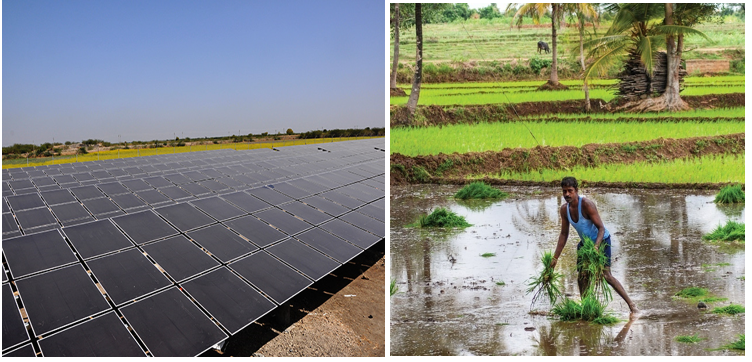India still is an Agrarian country in which agriculture depends mainly on monsoon rainfall. The agriculture sector is one of the most important industries in the Indian economy not only from the contribution to GDP point of view but also due to the fact that agriculture is labor intensive sector in India. Approximately 60 percent of the Indian population works in the industry, contributing about 18 percent to India's GDP. For the last successive years, the Indian subcontinent witnessed the changes in the arrival of southwest monsoon that led to a severe spell of the breakdown of monsoon, ultimately not covering the entire geographical region of India.
Topics like "Indian Monsoon” and “Solar energy” are the key areas from which UPSC ask questions in prelims and mains. During the preparation of the examination, aspirants lack the approach of covering these topics in an integrated manner to cover all dimensions. Aspirants should remember that; although topics like “Indian Monsoon” are mentioned under the syllabus of Geography, questions are asked in the Environment & Ecology and Indian economy section also.
"Indian Monsoon” and “Solar energy” is a part of the climate section and is very important since the Indian climate is dominated by this phenomenon. It is also significant for the country’s economy since a large part of the Indian agriculture sector is dependent on the monsoon which is interlinked with climate change. Hence, the importance of the monsoons for the IAS exam cannot be undermined.
Refer to Syllabus:
Aspirants should always remember that they need to refer to the syllabus as the first priority to understand the entire gamut of the UPSC Examination. It is a universal truth; be it prelims or mains exams, UPSC asks questions based on the syllabus. On average, around 70 to 80% of questions asked by UPSC are based on the syllabus.
UPSC has given a detailed syllabus for Mains examination and Prelims examination. UPSC has provided list of subjects with important topics. GS SCORE advises students to follow the syllabus prescribed by UPSC. It is important for examination to guide students in terms of, what topics need to be covered and what topics need to ignore.
Types of Questions Asked:
After analysis of the syllabus, aspirants should analyze the types of questions asked by UPSC. Understanding the pattern of asking questions and the areas from which questions are asked can help aspirants to prepare themselves far-far better for Civil services examination.
|
Question Related to Monsoon |
Question Related to Solar Activity |
|
Q. Which of the following is/are true about Easterly Jet stream?
Select the correct answer from the following codes a) 1 Only b) 1 and 2 Only c) 2 and 3 Only d) 1, 2 and 3 All |
Q. With reference to the term solar storm, consider the following statements:
Which of the statements given above is/are correct? a) 1 and 3 only b) 2 and 3 only c) 1 and 2 only d) 2 only |
Integrate/Interlink Topics:
Aspirants should look to develop a thinking pattern of critical analysis. Having the ability of critical analysis can help students in understanding the subject (topics) with a sound knowledge base and concept. 70% of the Prelims and Mains syllabus overlap, with the latter being more in-depth. That means by preparing for one; you can prepare for the other. While the topics covered are the same, the way questions are asked is different for each exam. Prelims phase is objective, it focuses on conceptual knowledge, on the other hand, Mains phase is subjective, and it focuses on analysis and current affairs.so, it is highly advisable for students to go for integrated preparation.
It is important that aspirants develop question asking abilities. Take an example of "Indian Monsoon” and “Solar energy”, aspirants should ask themselves a few questions like; why and how "Indian Monsoon” and “Solar energy” are changing and getting impacted. There are a few reasons like;
- Localized anthropogenic influences over the climate and environment, viz., degradation of forest coverage and other unknown causes.
- Solar radiative forcing over the global climate and the environment of the Earth.
Source to Cover:
- For Indian Monsson:
NCERT (most of the authenticated source of Study material for Civil Services IAS Prelims Exam as well as for IAS Mains Examination)
- Geography NCERT book from Class (6th to 12th)
- Newspapers (The Hindu, the Indian Express and Live-mint)
- GS SCORE Topical Analysis Series
- PIB
- Sansad TV (Science Special series)
- For Solar Activity:
- S&T NCERT book from Class (11th to 12th)
- Newspapers (The Hindu, the Indian Express and Live-mint)
- GS SCORE Topical Analysis Series
- PIB
- Sansad TV (Science Special series)
Lastly, newspaper reading will be useful, if students are aware of the syllabus and the pattern of asking questions as they can easily filter out irrelevant news for exam preparation and can focus only on news topics and analysis. GS SCORE is advising students to go for deeper analysis on the topics, only then there will greater possibility of doing justice with questions asked.
Related Articles



